If you are thinking vinyl flooring is still the same old cheap-looking plastic floor that you used to see, this post is going to change your mind.
The new generation vinyl flooring is totally different from the traditional vinyl flooring in the old time.
Let’s see what actually redefined vinyl flooring today and why vinyl flooring is a better choice.
Table of Content
- Why Choose Vinyl Flooring
- Professional Vinyl Installation Vs. DIY Vinyl Flooring Installation
- What is Vinyl Flooring?
- Benefits of Vinyl Flooring
- Why is Vinyl Flooring Not Perfect?
- Types of Vinyl Flooring
- Vinyl Flooring for Residential Application
- Vinyl Flooring for Commercial Application
- How Long Does Vinyl Flooring Last?
- How to Increase Lifespan of Vinyl Flooring?
- How to Repair Minor Flaws of Vinyl Flooring?
- Vinyl Flooring Designs and Patterns
1. Why Choose Vinyl Flooring
Vinyl plank flooring has gone through various stages of improvement over the years. It is tougher, more sturdy and durable than the old generation vinyl flooring.
Other than being functionally outstanding, vinyl flooring also comes back with more visual appealing characteristic like wood, stones, ceramic and even carpet look-alike designs in a variety of colours and textures.
Despite all the advance improvement, the price of vinyl flooring still remains competitive as ever in the flooring market. You can find some vinyl flooring that are way cheaper than laminate flooring.
But here’s a catch, even though vinyl flooring is widely promoted as a budget friendly flooring option, don’t expect that all vinyl flooring are cheap.
Vinyl flooring can be found in various forms, grades and qualities. The better the quality, the higher it costs.
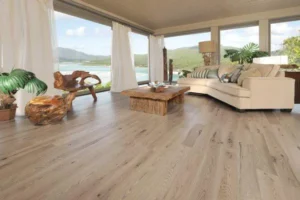
Speaking of quality, luxury vinyl flooring being the highest grade of vinyl flooring considered as the best in terms of durability, functionality and longer lifespan. So, do expect to pay a little more if quality is your primary concerned.
Other than that, installation options for vinyl flooring also show advancement ahead of other types of flooring. Vinyl flooring installation is simple and straightforward.
So it is definitely no surprise when vinyl flooring is also mentioned as diy-friendly floor.
But when it comes to self installation, you should really think twice before going for the diy option..
Wonder why? Keep reading to find out…
2. Professional Vinyl Installation Vs. DIY Vinyl Flooring Installation
Here are some important points to consider before you decide on how your installation should be done.
Professional Installation
- Proper preparation of subfloor.
- Satisfying flooring outcome.
- Time-efficient installation.
- Well-equipped with necessary tools and equipment.
- Skillful workmanship.
- Post-installation clean up service.
- Labour cost chargeable.
DIY Installation
- Inexperienced subfloor preparation.
- Flooring outcome maybe less favourable.
- Installation can be time consuming.
- Purchase of tools and equipments.
- Unskilled installation.
- No labour cost required.
- Post-installation self cleaning.
As vinyl flooring is very thin, any imperfections on subfloor and errors during installation can be very obvious. It is so unforgiving that blemishes or flaws due to improper installation can impact on the final outcome.
For those who have no experience, here’s a piece of sincere advice from the flooring expert in Malaysia.
Expert Tips:
Never risk letting poor installation ruin your flooring after you have spend so much time and money on selecting your favourite floorboard design.
Most importantly, any cause of floor board defects related to poor installation is not covered under manufacturer warranty. This term and condition of warranty also commonly found in warranty for outdoor wpc decking.
3. What is Vinyl Flooring?
Vinyl wood flooring is synthetic flooring created by compressing multilayer of man-made artificial material. Generally, it consists of 4 main layers and some can be even up to 8 layers depending on manufacturing brand and quality.
Starting from the backing layer, vinyl is normally used here as it is resistant to water and sudden impact. It also balance up the floorboard so problems like warping or cupping will never occur.
Next, the backing layer is topped with a high density fiberglass layer to increase dimensional stability.
This second layer is then followed by fine-printed high resolution design foil before continued by a layer of protective clear film.
Last but not least the multi-layer floorboard is finished by urethane wear layer.
Expert Tips:
Wear layer is the key factor determining durability of floorboard. So do look for floorboard with thick wear layer if you wish to have more durable flooring.
3.1 Evolution of Vinyl Flooring
Wonder how vinyl flooring manage to makes it way back to become one of the popular flooring options today?
Let’s trace back to the beginning and see what had actually happened in the old days.
Year 1926 – American inventor has discovered polyvinyl chloride (PVC), also known as vinyl.
1950s – Vinyl started to become famous and mostly used in commercial flooring.
1960s – Vinyl flooring was introduced as ‘no-wax’ and cushioned floor.
1980s – Health hazardous content: asbestos was completely eliminated from vinyl flooring.
1970s – Realistic wood-look vinyl plank was born.
4. Benefits of Vinyl Flooring
So, we have seen vinyl flooring has gone a long way to finally become the superstar of almost every home improvement. Let’s now look at all the charming parts of this amazing flooring.
4.1 Moisture Resistant
As one of the resilient vinyl floors without any content of wood, vinyl flooring is very resistant to moisture, humidity and water. It does not absorb moisture from surrounding and will definitely not swell or warp like hardwood flooring.
This has allow vinyl flooring to be the number one choice for wet areas like kitchen. Come to think about it, vinyl flooring could be an alternative to hardwood flooring!
4.2 Budget Friendly
If you ever notice, vinyl flooring actually comes with wide price range. It is very much depends on the quality you choose.

Luxury vinyl flooring with top-notch quality will normally cost higher than ordinary vinyl flooring. Despite that, vinyl flooring is generally much more affordable compared to other types of flooring.
Homeowners will actually save up more in the long run as there will be no extra maintenance fees needed for vinyl flooring.
4.3 Underfoot Comfort
The soft and warm underfoot comfort offered by vinyl flooring is incomparable to any hard surface flooring. The softness and flexibility of vinyl flooring helps protect your feet and makes you feel less tired even when standing for long hours.
Vinyl flooring maintains it’s warmness without affecting much by changes of surrounding temperature. This helps to keep your feet warm with good blood circulation especially when you are walking on barefoot.
4.4 Durable
Vinyl flooring is resistant to scratch and stains. Like any other resilient floorings, vinyl flooring is able to sustain high traffic environment without being worn off easily.
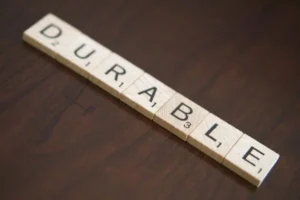
Do you know good quality vinyl flooring can actually last for 20 years or more?
Particularly when the vinyl floorboard is reinforced by fiberglass layer that maximizes the flexibility and strength of floorboard. This type of vinyl flooring is popular for heavy-duty usage.
4.5 Noise Reduction
Unlike hard surface flooring that tends to reflect noises of footsteps and create echoing, vinyl flooring does the opposite.
The PVC material used in vinyl flooring is able to absorb noises of heavy footsteps and even high heels.
The noise reduction feature of vinyl flooring will indeed help to reduce noises from daily activities especially when you have kids playing and running around the house. It is definitely a perfect choice for a quiet living environment.
5. Why Vinyl Flooring is Not Perfect?
Despite being versatile, multi-functional and close to perfection, we can’t deny the fact that there are less flattering sides of vinyl flooring. Let’s see what are the areas you should be expecting.
5.1 Difficult Sub-floor Preparation
Sub-floor preparation is one important step you should never neglect on when it comes to vinyl flooring installation.
The reason being, imperfections or uneven surface of sub-floor can be very obvious when vinyl flooring is installed. Not just that, uneven surface will tend to worn off your flooring more easily over time.
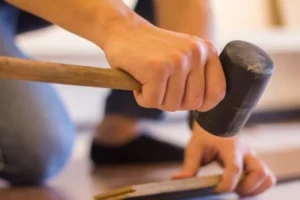
Therefore, be prepared to put in more time and effort to ensure subfloor is leveled, smooth and dust-free prior to installation.
Or you can leave the headache to us! Here at GetAFloor, our installer will go through thorough check on sub-floor condition to ensure it is all ready before installation begins.
5.2 No Resale Value
No matter how close vinyl flooring is to resemble natural hardwood, it is still synthetic flooring without any wood material used. So it is unsurprising that vinyl flooring does not add up to any resale value like hardwood flooring does.
On top of that, the cost of vinyl flooring is so affordable that it just doesn’t make sense if vinyl flooring really adds extra resale value to a property.
Think about it this way, vinyl flooring being a budget friendly floor does not require any maintenance which actually helps you to save more in the long run.
So does it really matters if vinyl flooring has no resale value? Probably not.
5.3 Emission of Volatile Organic Compound (VOC)s
Volatile organic compounds are chemical compounds that vaporize into the air.
If you ever come across this term, it is commonly found in various products like detergent, paint, wallpaper, furniture polish and the list goes on.
Basically, it’s almost everywhere without you realizing it! Vinyl flooring produced from PVC material also releases VOCs that impacts on indoor air quality.
But fret not, many manufacturers are aware of this issue and usage of PVC material in vinyl flooring has been reduced.
Here’s what you can do…
The noise reduction feature of vinyl flooring will indeed help to reduce noises from daily activities especially when you have kids playing and running around the house. It is definitely a perfect choice for a quiet living environment.
Expert Tips:
Keep your room ventilated after flooring installation and you may also check with your flooring manufacturer for emission standard certification or low-VOC vinyl flooring.
6. Types of Vinyl Flooring
One of the reasons for vinyl flooring to be so versatile in application is due to the fact that it is manufactured in different forms, thickness, functionality, installation method as well as quality.
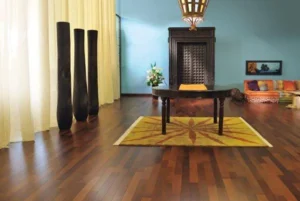
Homeowners can choose according to these categories for the vinyl flooring that meet their needs. Here’s what vinyl flooring commonly categorized in.
6.1 Vinyl Flooring In Different Thickness
Due to the difference in material, vinyl flooring is relatively thinner when compared to laminate flooring. Generally, thickness of vinyl flooring ranges from 2mm to 5mm.
Similar to laminate flooring, thicker flooring is better in quality. But wait, there’s more…
(i) 2mm Vinyl Flooring
2mm vinyl flooring is the cheapest among flooring of other thickness. Installation for 2mm vinyl flooring is normally done using glue-down method.
This thin layer of flooring is very sensitive towards any imperfection of subfloor.
2mm vinyl flooring is suitable to be installed on leveled and smooth concrete subfloor. Such sturdy subfloor will be sufficient to support vinyl flooring of 2mm thin.
In terms of durability, 2mm vinyl flooring is considered the lowest among the rest due to it’s thin wear layer. This means 2mm vinyl flooring is only suitable for low traffic usage.
(ii) 3mm Vinyl Flooring
Just as 2mm vinyl flooring, this 3mm vinyl flooring is not much difference in price with the same installation method. Since it is only 1mm more in terms of thickness, it is only suitable to be installed in low traffic area like guest room.
Unlike laminate flooring, it also requires a sturdy and flat subfloor for better support.
Durability of 3mm vinyl flooring is very much depends on the thickness of wear layer.
You may want to check out with your flooring manufacturer on wear layer thickness for better comparison.
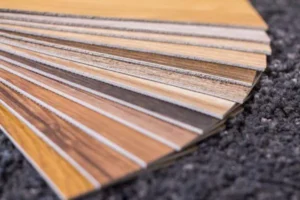
(iii) 4mm Vinyl Flooring
The price for 4mm vinyl flooring will be slightly higher compared to 2mm and 3mm floor.
Installation for 4mm vinyl flooring is normally done using glueless click together method, also known as floating method.
4mm vinyl flooring is more durable with it’s thicker wear layer. It is suitable to be installed for areas with more traffic and activities.
Again, any imperfection of subfloor is still pretty visible with this thickness.
It is undeniable that laminate flooring is does better job when in comes to hiding subfloor blemishes. So never risk laying vinyl floor without preparing your subfloor.
(iv) 5mm Vinyl Flooring
5mm vinyl flooring is considered the better in quality and the price is also higher.
Remember, you get what you pay.
Vinyl flooring of 5mm thickness is also denser and heavier which allow the floor to stay intact with subfloor without coming off easily. As thicker wear layer is used, 5mm vinyl floor is very durable and suitable for heavy usage.
It is able to sustain high traffic area without being worn off easily. This 5mm vinyl flooring also provides better noise absorption and underfoot comfort.
6.2 Vinyl Flooring with Special Features
(i) Heavy Duty Vinyl Flooring
As it’s name suggests, this type of vinyl flooring is more robust and resistant to wear and tear. Heavy duty vinyl flooring is extremely durable which makes it the number one choice for commercial and even industrial application.
Vinyl flooring with this feature are normally found in sheet form and it is thicker than ordinary sheet vinyl. It is more scratch resistant and tough enough to sustain sudden impact without becoming brittle or damaged easily.
Excellent performance of heavy duty vinyl flooring allows it to be used in various setting such as restaurant, gym, hotel, shopping mall and even factory!
(ii) Slip Resistant Vinyl Flooring
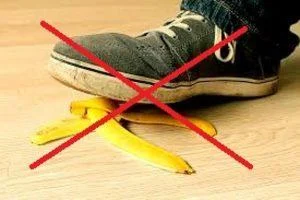
Generally, all types of vinyl flooring come with slip resistant properties. But the differences are the anti slip rating, which also known as R rating.
Most vinyl flooring consists of anti slip rating between R9 to R13. The higher R rating, the better it is in slip resistant.
So do look for R rating if you intend to install anti-slip vinyl flooring.
Higher R rated slip resistant vinyl flooring is normally used for hospitals, elderly care center, nursery as well as dance studio.
Slip resistant vinyl flooring is a perfect choice for slip risk area.
But there’s a catch, it’s effectiveness on slip resistant is only applicable to dry flooring.
After all, there is hardly any type of flooring would claim to be anti slip even when it’s wet.
(iii) Anti Static Vinyl Flooring
This type of vinyl flooring helps prevent trigger of static electricity.
Not many know the fact that this little zap of static shock seems nothing to us but it can potentially damages sensitive equipment. Particularly, medical equipment in hospitals and clinics.
Most of these equipments are to be stored in static-free environment for better protection and accuracy. Therefore, anti static vinyl flooring is a popular flooring option in medical fields and laboratories.
In fact, it is so common that it is also called hospital standard vinyl flooring.
The next time when you heard this term, don’t be confused by thinking that it’s a different type of flooring. It simply means anti static vinyl flooring.
6.3 Vinyl Flooring Installation Method
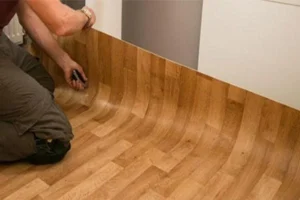
(i) Glue Down Installation
This method is also commonly known as non-floating method. It involves application of adhesive to attach flooring to your subfloor.
Generally, there will be 2 types of adhesive used for vinyl flooring installation, which are pressure sensitive adhesive and hard set adhesive.
If you are installing vinyl flooring for temporary usage like mini-stalls or exhibition, it’s not a bad idea to use glue down vinyl flooring with resealable adhesive.
This allows the floor to be reinstalled for the next usage. Vinyl flooring with thickness less than 4mm generally installed using glue down method.
(ii) Floating Installation
Floating system also known as loose-lay installation. It includes the click together installation which derived from laminate flooring click-lock installation.
Unlike glue down installation, this method does not require any application of adhesive.
When comparing both glue down and floating system, floating vinyl floor generally has better cushioned underfoot feel and the outcome is more elegant than glue down vinyl flooring.
That is also why floating system is very popular especially for luxury vinyl flooring.
Floating installation also allows underlay like sound insulation mat to be installed easily underneath vinyl flooring.
Vinyl flooring with thickness above 4mm are normally installed using floating system.
7. Vinyl Flooring for Residential Application
Vinyl plank flooring being a resilient floor has been receiving plenty of good feedback from homeowners. It not only provides visual aesthetics to the house but also functionally remarkable.
Let’s look at the wonders vinyl flooring bring to each and every room in the house.
7.1 Vinyl Flooring for Living Room
As living room is the most happening place in the house, it is equally important to have flooring that looks good and supports different facets of living at the same time.
Vinyl flooring close imitation to genuine wood plank helps to create touch of warmness to the living room.
This popular design is available in different shades and tones for homeowners to choose from.
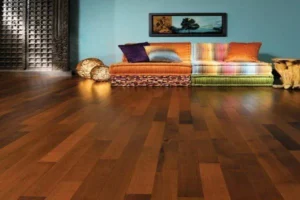
Here’s good news to homeowners: daily housekeeping can be effortlessly easy with vinyl flooring. Regular sweeping and mopping are all it takes to maintain a clean and hygienic household.
The extra underfoot comfort of vinyl flooring also helps in providing a more enjoyable living environment.
7.2 Vinyl Flooring for Bedroom
Other than sleeping, bedroom also serves as a place where you relax and enjoy peace of mind after a long day.
Unlike hardwood or ceramic flooring that tends to be noisy to walk on, vinyl flooring absorbs noise without reflecting it, providing you a quiet place to sleep.
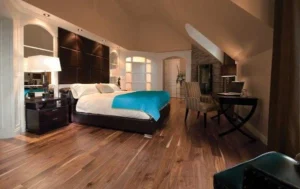
Vinyl flooring remains warm most of the time without being easily affected by surrounding temperature. It will be delightful to step onto a warm surface rather than cold hard floor the moment you wake up from bed.
The cushioned softness of vinyl flooring is literally an exquisite treat of your underfoot comfort!
Vinyl flooring is also hypoallergenic, which is perfect for anyone suffering from allergy.
7.3 Vinyl Flooring for Kitchen
Vinyl plank flooring is stain resistant and extremely easy to clean. Cleaning up your kitchen from now and then can be less hectic when vinyl flooring is installed.
It is considered a hygienic flooring option as it does not trap moisture, dirt or dust and remain in dry condition. In other words, there is no chance for growth of mold or parasites.
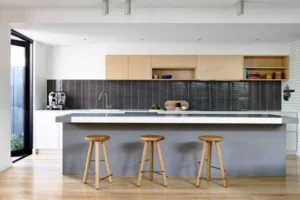
The slip resistant surface of vinyl flooring also helps to make greasy and damp kitchen floor a safe place to walk on.
Anti-slip function of vinyl flooring is especially necessary when you are having elderly family members and children in the house.
Not to forget the crucial point: Water resistant feature of vinyl flooring also makes it perfect for kitchen flooring.
7.4 Vinyl Flooring for Laundry Area
One of the main criteria for laundry area flooring is waterproof.
Vinyl flooring is highly resistant to water with it’s moisture impermeable surface.
As vinyl flooring is made of artificial product without any wood content, you will not find problems like blistering, warping or cupping that normally happen on hardwood flooring.
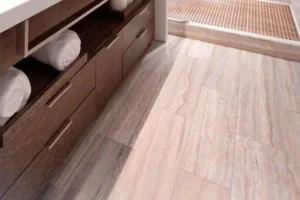
Other than being water resistant, vinyl is a safe flooring option for laundry area. It’s 3D embossed surface helps create anti-slip feature, making your laundry area less slippery and reduce accidents at home.
Vinyl flooring is also relatively affordable when compared to other type of flooring.
The various outstanding designs of vinyl flooring will definitely brighten up your laundry area while keeping it a safe and hygienic place in the house.
7.5 Vinyl Flooring for Pets
If you are a pet lover, having your pets running around the house could lead to unimaginable damages to your expensive flooring. Pet’s claws, nails and acidic urine are what normally ruin the flooring surface.
Vinyl flooring is a must-have pet-friendly floor as it is resistant to scratches and able to withstand pet’s traction.
It is easy to clean and does not trap odor. Living with your pet will never smells especially with vinyl flooring.
Some vinyl flooring comes with anti-bacterial feature.
You can be sure to maintain a clean and hygienic environment for your family.

The cushioned-like comfort of vinyl flooring also provides a comfortable surface for your pets to lay around.
7.6 Vinyl Flooring for Dining Room
Considering the versatility of vinyl plank flooring, installing it in your ever busy dining room could be a perfect choice.
Vinyl flooring is extremely durable which is good in sustaining high foot traffic and frequent chair movement. It’s protected with thick anti-scratch wear layer and do not worn off easily.
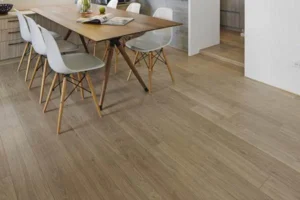
The famous water resistant feature of vinyl flooring also makes your floor impermeable to any spillage of drinks or food. Here’s the best part: those food stains can be wipe off easily without staining the floor!
This easy upkeep and cleaning of vinyl flooring helps to ensure a hygienic dining environment. It’s slip resistant also act as a safety function in everyday living.
7.7 Vinyl Flooring for Stairs
It is pretty common to find vinyl flooring installed on stairs due to it’s quick and easy installation. Aesthetic wise, vinyl flooring is adorning and blends in harmoniously with any interior styles and upholstery.
Unlike carpeted stairs that are difficult to clean and tend to be dusty overtime, vinyl flooring stairs are easy to clean and does not trap dust or dirt.
It is also odorless as it does not absorb moisture due to surrounding humidity.
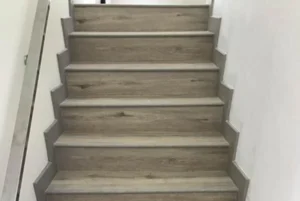
Vinyl flooring anti-slip feature helps prevent accident like slip and fall while walking on the stairs.
The sound insulation characteristic of vinyl flooring also tune down sound of footsteps when walking up or down the stairs.
8. Vinyl Flooring for Commercial Application
As you can see, vinyl flooring provides long list of benefits that out stand other type of flooring. These advantages of vinyl flooring are also very much appreciated not just in residential application but also in commercial industry.
Here are the areas where vinyl flooring is commercially used in.
8.1 Vinyl Flooring for Retail Stores
One of the reason why vinyl flooring is so popularly used as retail stores’ flooring, is due to it’s high durability.
Robust and resilient floor like vinyl flooring is a must to sustain high foot traffic as well as frequent wheeling of trolleys and carts.

On top of that, vinyl flooring is also visually stunning and creates an overall welcoming atmosphere for the customers to shop.
The ease of cleaning of vinyl flooring also keeps retail stores to look clean and tidy all the time. As retail stores are busy and sometimes crowded with customers, having a sound insulating floor like vinyl flooring greatly helps in reducing noises of footsteps.
8.2 Vinyl Flooring for Restaurants
If you ever notice, most restaurants nowadays use vinyl plank flooring which is aesthetically pleasing and affordable.
Hygiene of restaurant can be maintained well as vinyl flooring is easy to clean. This helps create a lasting positive impression to customers by providing a clean and comfortable dining experience.
Durability of vinyl flooring is also another reason why it is so popular among restaurant owners. It’s scratch resistant, tough, able to support heavy usage and high foot traffic in the restaurant.
Not just that, the long lifespan of vinyl flooring also helps restaurant owners to save up more without spending on unnecessary maintenance.
8.3 Vinyl Flooring for Offices
Have you ever been disturbed by noises of footsteps while you were concentrating on your work? No worries, you can totally eliminate this nuisance with sound insulation flooring!
Vinyl flooring is able to absorb noises without reflecting them, creating a quiet office environment.
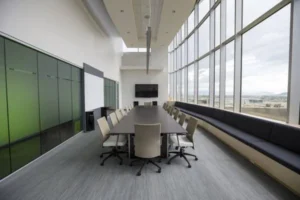
Unlike the traditional dull-looking carpet floor found in the office, vinyl flooring comes with a wide variety of designs and patterns that will definitely brighten up your office.
Other than that, it is also much easier to clean and maintain if compared to carpet floor.
Vinyl flooring is durable, scratch resistant and anti-staining, which perfectly suits busy working environment of offices.
8.4 Vinyl Flooring for Gym
Ditch the traditional carpet or foam flooring at your gym. Heavy duty vinyl flooring not only works well in supporting all the heavy gym equipment, it is also more hygienic and odor free!
Vinyl flooring with thick wear layer does not scratch easily which is perfect for fitness class and dance lessons.
As sound insulation is one of the basic requirements for gym, vinyl flooring performs well in absorbing noises from gym equipment during work out.
Installation of vinyl flooring is quick and easy together with budget-friendly price; it is no wonder that vinyl flooring has gained favors from many gym owners. You can now work hard and play hard with vinyl flooring!
8.5 Vinyl Flooring for Schools
There are many areas at school which are suitable to be installed with vinyl plank flooring due to it’s versatile functionality.
First off, vinyl being a durable floor material is able to sustain high foot traffic and various school activities. It does not wear off easily and have a long lifespan covered under years of warranties.
Vinyl flooring is also cost effective which helps to save up a lot especially for large scale school flooring project.

Thanks to it’s sound insulation feature, vinyl flooring can be installed in various setting at school including library, classroom, music room as well as cafeteria.
8.6 Vinyl Flooring for Elderly Care Center
Vinyl flooring is extremely durable in supporting the daily activity of senior citizen including frequent movement of chairs, wheeling of wheelchairs and walkers.
It is also very easy to clean and maintain. Any spillage of liquid or vomit on the floor can be easily wiped off without causing stubborn stains and unpleasant smell.
What elderly afraid the most is slip and fall as it can turn into a life threatening situation.
Vinyl flooring with it’s anti-slip properties provide better safety to elderly by reducing the chances of falling.
Other vinyl flooring features like sound insulation and extra underfoot comfort also helps create a perfect environment for senior living.
9. How Long does Vinyl Flooring Last?
Speaking of vinyl flooring longevity, let’s go back to the basic principle: Lifespan of vinyl floor generally depends on it’s thickness and wear layer.
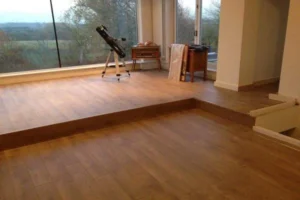
So what’s the average life expectancy of vinyl flooring?
9.1 Average Lifespan of Vinyl Flooring
To be fair, it is impossible for all varieties of vinyl flooring to fall into the same range of lifespan.
Thin vinyl flooring is generally more vulnerable than thick vinyl flooring. It will only last between 5 to 10 years under light foot traffic. Thick vinyl flooring normally lasted up to 25 years.
Other than thickness, amount of usage also affects greatly on longevity of vinyl flooring.
9.2 What Determines Vinyl Flooring Lifespan?
As mentioned above, it is clear that lifespan of vinyl flooring can be affected by many factors. Based on the experience from our flooring expert, here are a few common factors found to relate with vinyl flooring lifespan.
9.3 Contributing Factors on Vinyl Flooring Lifespan:
(i) Quality of Vinyl Flooring
Thick vinyl flooring with thick wear layer is more durable when it comes to sustaining scratches and abrasion from any sharp objects like pet’s claws, sands and sharp ends of heavy furniture.
So do look for vinyl flooring with thick wear layer for a longer lasting floor.
(ii) Pre-installation Preparation
This is on crucial step that not only determines how well vinyl flooring is installed, it also affects on the lifespan.
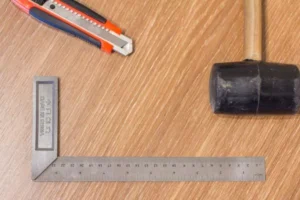
Subfloor that is not well leveled, with uneven surfaces will definitely cause vinyl flooring to be worn out more easily. Higher or protruding areas are exposed to more friction and pressure.
That is why you will find some areas are more easily worn off.
(iii) Amount of Foot Traffic
Never expect thin vinyl flooring to sustain the same amount of foot traffic like thick vinyl flooring does. Thin vinyl flooring is only suitable to be installed at low foot traffic area.
Otherwise, your thin vinyl flooring can probably wear out faster than you expect.
(iv) Proper Clean and Care
Cleaning of vinyl flooring is easy and straightforward but don’t over do it.
Avoid using certain cleaning tools that will damage the floor protective layer. If necessary, place mats or rugs to protect certain areas of the floor.
9.4 What Comes Under Warranty?
Vinyl flooring warranties differ across quality, type and retailer. Basically, warranty of vinyl flooring includes:
- Free of water damage threat
- Free of manufacturing defects
- Protected against termite damage threat
Do be extra cautious on the terms and conditions of your flooring warranty.
Most manufacturers do not tolerate with warranty claim related to improper installation, damages caused by poor workmanship and improper maintenance.
10. How to Increase Lifespan of Vinyl Flooring?
Other than choosing good quality vinyl flooring, there are still more ways to ensure a longer lasting vinyl flooring.
Here’re some suggestions from the expert.
(i) Correct Cleaning Method
Just like laminate flooring, sweeping and mopping of vinyl flooring is sufficient to keep it clean.
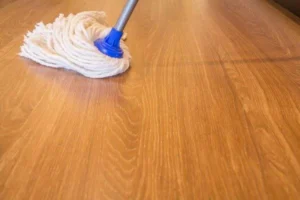
Avoid using steam cleaner as the heat and moisture generated will potentially weaken the adhesive bond of flooring and even affect dimensional stability of your floor.
(ii) Use Non-staining Furniture Protector
As sharp edges of furniture may lead to indentation or puncture on floor surface, it is advisable to place non-staining protective pad beneath your furniture.
This is very useful in protecting surface layer of flooring from wear and tear. Bear in mind that only non-staining protector should be used to avoid antioxidant staining.
(iii) Avoid Strong Chemical Solution
Although vinyl flooring is protected with wear layer, application of strong cleaning solution is detrimental to your flooring.
Overtime, strong cleaner will wash off the natural gloss and shine of floor surface, making your floor looks old and dull. Besides, usage of pigmented cleaning agent is also not recommended.
(iv) Hire Flooring Professional Installer
As poor installation can be a serious threat to vinyl flooring, make sure your flooring is first installed correctly according to manufacturer instruction.
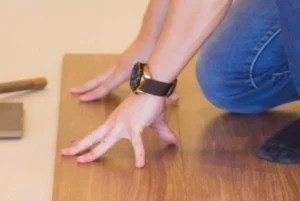
It is the most basic step to take so that your favourite flooring is handled with care from the very beginning!
Having professional to install flooring not only prevent errors but also prepare you the durable flooring that last for many years.
11. How to Repair Minor Flaws of Vinyl Flooring?
It is inevitable to find minor damages or blemishes on floor surface after years of installation.
Instead of looking for professional help, do you know you can actually repair these minor flaws all by yourself?
Let’s look at some common issues of vinyl floors and solutions provided by the flooring expert.
(i) Tackle Bubbles and Bulges
Ever notice some bumps or bulges on your flooring?
No worries, there is a way of rescuing it.
Cover a layer of thin cloth or tea-towel on top of the bulges. Place hot iron on top of the cloth and slowly iron the bulges away.
Next, put weight or a stack of books on top for a while to keep the surface flatten. There you go, you will find the little bumps and bulges on the floor slowly disappear and well flatten.
(ii) Cover up Small Scrapes and Cuts
Thin vinyl flooring is vulnerable to scrapes and cuts especially in busy area with lots of movement. Action should be taken to prevent tiny cuts to spread or split up further.
Here’s what you can do.
First off, you need to make sure the small hole or cut is well cleaned, dirt and dust free.
Next, use vinyl seam sealant to carefully seal up the area.
This step is effective in preventing lower layer of vinyl flooring from being torn completely.
(iii) Repair for Major Damages
In case of severe splits, cuts or damages of vinyl flooring, sealant will not be sufficient to cover the damage.
All you can do is to replace the defective piece of vinyl flooring.
Depending on the type of installation system adopted, different method should be use on removing the defective piece.
12. Vinyl Flooring Designs and Patterns
Similar to laminate flooring, vinyl flooring is also available in wide range of wood-look designs. What makes vinyl flooring more interesting is it’s design does not limited only to wood resemblance.
Let’s see what are the design options available for you to choose from.
(i) Wood Vinyl Flooring
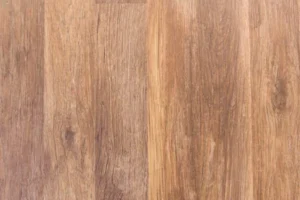
Feature: Extensive range of faux hardwood design with prominent wood grain, texture and tone.
Suggested Design Concept: Modern Scandinavian, Minimalist, Modern Balinese, Industrial, Mid-Century Modern, Traditional and Contemporary.
(ii) Stone Vinyl Flooring
Feature: Artistic granite and marble stone texture of realistic veins and fissures in different tone and shades.
Suggested Design Concept: Modern, Minimalist, Urban, Hollywood Glam, Shabby-Chic and Victorian.
(iii) Carpet Vinyl Flooring
Feature: High resolution seamless carpet-look in different fabric texture and fiber arrangement.
Suggested Design Concept: Mid-Century Modern, Modern Luxury, Contemporary, Abstract, Transitional and Post-Modern.
